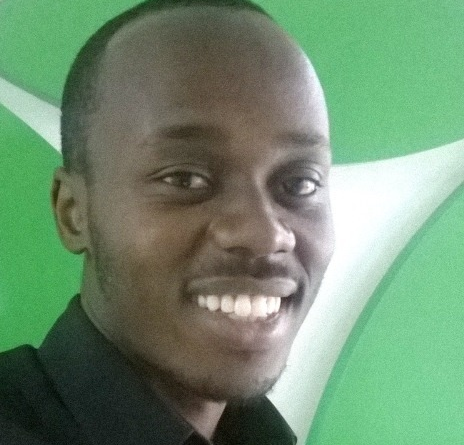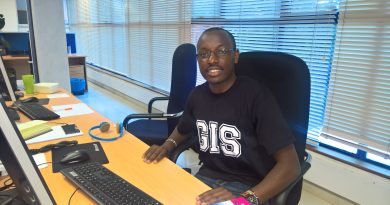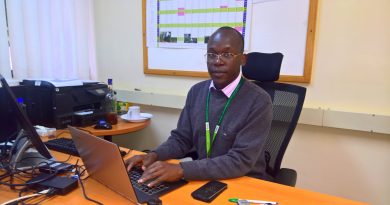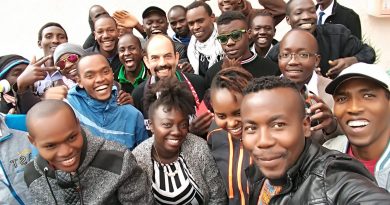Alumnus of the Week; Network Security Engineer, Sammy Luvinzu
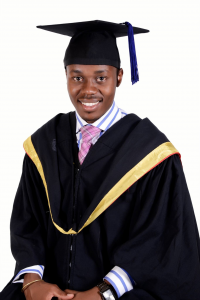
Computers are all pervasive. Almost every aspect of daily life from shopping in a supermarket to flying abroad depends on highly sophisticated computing systems.
The challenges in designing and delivering effective, safe and cost-efficient systems require a complex integration of application knowledge, software, and electronics, interfaced to a rapidly changing world.
With continuing advancing technologies, high expectations of users and increasing statutory requirements, the need for suitably qualified and accredited engineers is as important as ever.
Jomo Kenyatta University of Agriculture and Technology aims to equip those seeking a broad view of these systems.
Unlike pure computing degrees which often concentrate on the software, scientific and mathematical aspects of computing, our degree programmes aim to provide a much wider range of engineering skills, particularly in hardware and electronic systems.
Sammy Luvinzu is a Network Security Engineer at Dimension Data and an alumnus of JKUAT, having pursued a Bachelor or Science degree in Electronic & Computer Engineering.
- Who is Sammy Luvinzu? When people think of you, what do they say or perceive? Describe yourself in one sentence.
I’m a rather quiet thinker, a Christian passionate about being a husband & father and a man who loves technology and engineering.
- When did you join JKUAT and why did you choose to study Electronic & Computer Engineering?
I’ve always loved science and particularly technology. Studying Electronic & Computer Engineering was a dream come true for me. I chose JKUAT because of I was advised that they are the best in engineering courses in the country.
- What was your experience at JKUAT in terms of:
- The quality of training.
The JKUAT exam system was quite fair – you would reap what you sowed. We had a number of good lecturers that I really appreciated but there were some that left a lot to be desired. Overall, though I learnt quite a number of good technical things, there was no strong relevance to current technologies and a notable discrepancy between what is taught in class and what was examined.
- Training equipment, resources and facilities.
We were exposed to a good range of basic equipment but not to the most current technologies. The library offered a good range of academic resources and reading space. However, on-campus internet was neither widely accessible nor reliable.
- Support offered by lecturers in and out of the classroom environment.
Lecturers were generally approachable but we never had the department have a lecturer or T/A run a tutorial class even though it was booked in the timetable.
- Practical training.
We had numerous lab exercises with real equipment but the lab material & equipment were largely dated.
- Extracurricular activities engagement. (We’re you involved say in sports or any other activities apart from your academic pursuits?)
I was part of a Christian fellowship (Nairet) that used to meet & hold plays and organize other missions. I also used to run at the school fields and was able to participate in numerous half-marathons because of that.
- What does your work as a Network Security Engineer entail? Give us a run through of your duties and responsibilities.
My responsibility as a network security engineer entails design & implementation of various network security solutions for enterprises in the region and technical support of these solutions to ensure critical business services are available and secured. My responsibilities can be summarized as handling the implementation of these network security projects from design to implementation to documentation & sign-off then technical support to assist clients when their in-house IT team is unable to resolve technical challenges with these systems. We are largely self-managed in our team and take charge of our projects and support cases. Our days tend to be unpredictable because of the support calls and we frequently work long hours to resolve complex issues which mean we have to work extra hard to finish our projects in good time.
- Is your line of work related to the course you pursued at JKUAT? Has the training you received at JKUAT helped you in any way or did you have to do a lot of on job training?
In terms of content, not really. I’ve had to do a lot of on-job research and training. However, the skills we acquired doing a lot of reading & research for ourselves in JKUAT has helped me with the learning demands of my line of work.
- Where do you see yourself five years from now? (In your career, academics, and personal life.)
I see myself as a respected senior network security professional with a master’s degree and having grown in wealth.
- Parting shot. (Your last remarks. Could be advice to current students, overview of the industry in relation to electronic or computer engineering, or anything else you’d like to add.)
Work hard and work smart while on campus. Don’t waste time on things that will be of no benefit in 5-10 years. At the same time, focus on getting to know God, to understand yourself and enjoy building friendships that will last. Technically, be a lover of knowledge and you will go far as an engineer.

